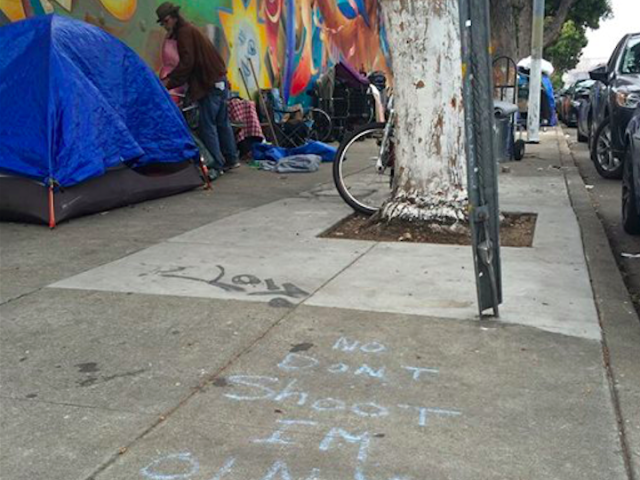With the second-highest density of homeless people in the United States, San Francisco tech titans are funding Measure Q on the November ballot, which would allow police to give 24 notice before clearing homeless street camps.
San Francisco, with a homeless density population of 795 people per 100,000 residents, is second only to New York City, with a density of 887 per hundred thousand. The next most dense are Seattle with 487, and Philadelphia with 384.
San Francisco’s homeless population is highly unique, since about 71 percent of the people living on the streets originally came from the city, according to the city’s homeless survey.
With San Francisco continuing to be one of the most expensive places to live in the nation, the city has opposed building new housing and has seen a huge amount of lower-cost housing converted to Airbnb short-term rental units.
According to said Zillow Chief Economist Svenja Gudell, renters outnumber homeowners in San Francisco, and the average renter pays a state high of 41 percent of his or her income on an apartment. That burden means most renters are living paycheck-to-paycheck, and are not saving anything for an emergency. Gudell comments that San Francisco is “highly zoned or highly regulated” to prevent any new residential housing stock.
Many of the homeless are former renters that gave up paying rent and just set up tents on the street. The campers had benefited from the “People’s Republic of San Francisco” entitlement mentality that allowed homeless to squat and provided multiple meals each day, free transportation vouchers and other entitlement services.
San Francisco’s “official general street count” is estimated to be 6,686 homeless adults, in a city with only 1,000 temporary first-come-first-served shelter beds available each day.
According to the Virtual Tourist website, large slices of San Francisco are now on their “Avoid List” due to the big concentrations of homeless. Currently the worst rated areas in the city are, 1) Eddy, Ellis Street and much of downtown; 2) Alamo Square, where car windows are often smashed; 3) Union Square, for aggressive panhandling; and 4) open drug and mentally ill people in the Tenderloin.
But after a decade of rising frustration and growing embarrassment, top Bay Area tech players — including start-up investor Ron Conway, Sequoia Capital chairman Michael Moritz, and investor William Oberndorf and Yahoo CEO Marissa Mayer’s husband, Zach Bogue — have each donated $49,999 to support Measure Q on the November ballot.
Under the initiative, police would be able to give homeless people 24 hours to clear their tents, shopping carts and other belongings from sidewalk encampments, or face seizure of their property. Campers would be offered bus tickets to go stay with friends or family outside the city.
San Francisco supervisor Mark Farrell authored the measure to “help get the homeless into housing” because it’s “not compassionate to allow human beings to live on our city streets.” He emphasized that as an added safeguard to protect the mentally ill, a homeless person’s tent could only be removed if there is a shelter space available
Progressive opponents of Measure Q claim that real aim of the effort is to remove the eyesores that are seriously undermining the tourist populations who want to visit the romantic “City by the Bay” to wander in the fog and ride cable cars. The progressives complain that Measure Q ejects the homeless without funding housing.
The San Francisco Chronicle has taken grief from angry residents for recommending voters oppose the measure that the paper describes as unnecessary. A recent editorial claimed that under the current code, “city teams give multiday warnings before scooping up the homeless and their possessions for interviews, treatment and placement or a ticket out of town.” The paper added that the status quo should be favored when it comes to dealing with the homeless: “It’s painstaking, slow work, and not the one-shot answer that this measure calls for.”

COMMENTS
Please let us know if you're having issues with commenting.